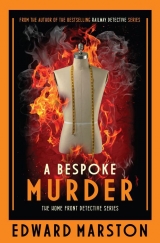
Текст книги "A Bespoke Murder"
Автор книги: Edward Marston
Жанр:
Классические детективы
сообщить о нарушении
Текущая страница: 3 (всего у книги 18 страниц)
‘Thousands of other able-bodied men have already volunteered.’
‘That’s their business.’
Marmion regarded him with a mixture of interest and contempt. He’d met a lot of people like the plumber, resentful men with a hatred of any authority and a particular dislike of the police. From the way that Coley seemed at ease in custody, Marmion deduced that he’d been in trouble before. One thing was certain. Coley had not been alone. He knew others who’d been party to the attack on the shop. He had the names that could be useful in the inquiry.
‘Who else was with you?’ asked Marmion.
Coley shrugged. ‘I was on my own.’
‘What about the man you claim handed you that suit?’
‘Never set eyes on him before.’
‘I don’t believe that he existed. Your friends, however, do exist. You run with a pack. You wouldn’t have the courage to do anything like that on your own. A man who’s too afraid to fight for his king and country needs someone else to hide behind.’
‘I’m not afraid of anything!’ yelled Coley.
‘Not even a long prison sentence?’
‘You can’t send me to prison. I done nothing wrong.’
‘That’s not what the jury will think,’ warned Marmion. ‘You were part of a mob involved in arson, trespass, theft, wilful destruction of private property and – directly or indirectly – in the death of the owner of the shop. Mr Stein was upstairs at the time.’
Coley swallowed hard. ‘I never touched him.’
‘That may be true but you might know someone who did. At the very least, you know other people who were there and they, in turn, can give us additional names.’ Marmion put his face close to him and spoke with quiet menace. ‘However long it takes, I’m going to track down every single person who was involved in that disgraceful attack and bring them to justice. The one I’m most anxious to meet is the man who started that fire then threw petrol on to it. Was it you or one of your friends, sir?’ Coley shook his head vigorously. ‘I’ll leave you to think it over. When I come back again, I’ll expect you to remember the names and addresses of those who brought you all the way from Shoreditch so that you could vent your spleen on an innocent man.’
‘I had nothing to do with that fire,’ asserted the prisoner.
‘Then who did?’
Coley eyed him warily. All his defiance had gone. The one thing on his mind was self-preservation. The scale of the notional charges against him was unnerving. When he’d been arrested before, he’d always managed to get away with a fine. Not this time. Inspector Marmion had rattled him. The prospect of a prison sentence suddenly seemed a real one. Coley tried to win favour.
‘I saw someone carrying a petrol can,’ he confessed.
It was a start. Marmion was content.
CHAPTER FIVE
To relieve the boredom of the long wait, Joe Keedy chatted to one of the policemen. Having spent years in uniform himself, Keedy had compassion for the men who patrolled the streets on their beat in all weathers. They were a visible deterrent to criminals and a sign of reassurance to the law-abiding public. Since the war started, the scope of their duties had widened considerably and they worked assiduously to discharge them. Notwithstanding their best efforts, however, they sometimes came in for harsh criticism. Herbert Stone was their latest detractor. He was pulsing with exasperation.
‘It’s maddening,’ he complained as he came over to Keedy. ‘The fire brigade is almost as bad as the police force.’
‘They’re only doing their job, sir,’ said Keedy.
‘Then why don’t they do it properly? The same goes for the police. You knew that trouble was expected. After what happened to the Lusitania, there were bound to be repercussions. Why weren’t more of you on duty?’
‘We can’t police every street in London.’
‘People like my brother deserved preferential treatment,’ insisted Stone. ‘He was a man of standing in the West End. I’ll raise the matter with the commissioner himself – and I’ll also have stern words to say about the fire brigade.’
‘Why is that?’
‘I’ve been insulted, Sergeant. The officer in charge of the operation has just told me that, if I don’t stop badgering him, he’ll have me removed by the police.’
‘He doesn’t want to be impeded, sir.’
‘I’m not impeding anyone,’ argued Stone, pointing at the shop. ‘My brother is dead in there. I’m entitled to know why they’re taking such an eternity to bring him out.’
‘It’s still too dangerous to go in,’ said Keedy, seeing a chance to get rid of him. ‘My information is that it may be past midnight before they’ve cleared the debris. There’s really no point in hanging on until then, sir. You can’t make a formal identification here. That will have to be done at the morgue.’
‘I want to see my brother.’
‘Perhaps you should consider his family, Mr Stone. His wife will be worried sick and you mentioned a daughter earlier. She’s bound to be very anxious. In the event of bad news, they need to be prepared.’
It took Stone a few moments to regain his composure.
‘Yes,’ he conceded, anger subsiding, ‘you’re right, Sergeant. My sister-in-law will fear the worst and so will Ruth. They must be told the truth.’ After consulting a pocket watch, he reached a decision. ‘I’ll drive back to Golders Green. This is not something that I can do over the telephone. I need to be there in person.’
‘That’s very considerate of you, sir.’
Stone wagged a finger. ‘But I’ll want to know the moment the body has been moved.’
‘We’ll contact you at once.’
‘Here’s my card.’ Slipping the watch back into his waistcoat pocket, he took out his wallet and extracted a business card. He handed it to Keedy. ‘Ring that number any time of night. I’ll be up.’
‘Leave it with me, sir.’
‘Out of respect to my brother, I feel that I ought to stay,’ said Stone with a final glance at the shop, ‘but you’re right – my place is with his family. Goodbye, Sergeant.’
‘Goodbye, sir.’
‘We don’t want to impede the fire brigade any more, do we?’
On that sarcastic note, Stone wheeled round and headed off towards the street where he’d parked his car. Aggressive as the man’s manner had been, Keedy nevertheless felt sorry for him. Losing a brother was a severe blow and Stone now had to pass on the bad tidings to his family. Keedy did not envy him the task. In the course of his work, he’d had to impart bad news to people and most had been unable to bear it. He hated being the one to spread grief and despair.
Now that the fire had been extinguished, the firemen were working heroically to clear up the mess so that they could shore up the vestiges of the ceiling. Because a famous British vessel had been sunk, a business that had taken many years to build up had been burnt out of existence in little more than two hours. Its proud owner, it seemed, had been murdered and his safe plundered. It was not simply a case of mob violence. They were looking for a killer.
A car approached and pulled up nearby. Marmion got out and surveyed the scene before strolling over to Keedy.
‘I don’t see Mr Stone anywhere,’ said Marmion.
‘I sent him home, Inspector. He was making a nuisance of himself to the fire brigade and he was far from complimentary about the police. I pointed out that his brother’s family would be desperate for news and implied that he was the best person to deliver it.’
‘Well done, Joe. He has my greatest sympathy but the truth is that he was only in the way.’
‘It was a double triumph,’ boasted Keedy. ‘I not only got rid of him, I saved us the awkward job of being the bearers of bad tidings.’ His grin warned Marmion that there was a joke coming. ‘You might say that I killed two birds with one Stone.’
Marmion groaned. ‘I’m glad you didn’t tell him that.’
‘How did you get on at Vine Street?’
‘Oh, it was worth the visit. One of the men arrested had nothing of value to say but the other was quite helpful once I’d persuaded him of the dire position he was in. He gave me the names and addresses of three friends involved in the incident, so we’ll be able to pay them a visit. He also told me that he saw someone carrying a can of petrol.’
‘You thought something was used to speed up the fire.’
‘With luck the can will have been discarded,’ said Marmion. ‘It may be somewhere under that rubble. Oh,’ he went on, ‘there was another snippet of information I picked up at Vine Street. The station sergeant told me that Jacob Stein’s daughter called in there to report the fire. She was very agitated. In fact, she was in such obvious distress that the sergeant asked one of his men to take her home on the Tube. I feel for the girl,’ said Marmion with a sigh. ‘Ruth Stein is going to be even more distressed when she learns what happened to her father.’ Still wearing her dressing gown, Ruth was curled up on the sofa in her mother’s arms. She had not been pressed for details or forced to relive the horrors of her ordeal. Somehow her mother understood what her daughter must be going through and spared her any questioning. Miriam uttered no words of condemnation, nor had she summoned the doctor. That could wait until morning. What her daughter needed most was the uncritical love and sympathy of a mother and that is what she was given. It helped to still Ruth’s fears and enable her to count her blessings. She’d come through a terrible crisis but she was still alive. She still had a home where she was adored. Overshadowed as it might be, she still had a future. That was not the case with her father. Jacob Stein had still been in the building when it was set alight. Had he escaped, he would surely have come back to the house by now or, at the very least, have made contact by telephone.
They heard the sound of car tyres scrunching on the gravel in the drive. An engine was turned off. Ruth felt her mother’s grip tighten in trepidation for a few seconds, then the two of them got up and went into the hall. When Miriam opened the front door, her brother-in-law was getting out of the car. The expression on his face told them what had happened. Ruth burst into tears, her mother enfolded her in her arms and Stone ushered the two of them gently back into the house.
Harvey Marmion hated having to visit the morgue. It brought back unhappy memories of the time when he’d been called upon to identify the corpse of his father. It had been a harrowing experience. As he looked at the body of Jacob Stein, he was relieved that his father had not been reduced to such a hideous condition. Fire had burnt off the clothes of the dead man, singeing his hair and eyebrows, then eating hungrily into his flesh. Marmion could hardly bear to look at the blackened figure but Joe Keedy was studying it with interest, noting the ugly gash in the chest. When they had been able to reach the body, the detectives had it removed under cover so that it escaped the prying eyes of the press. Marmion would have to make a statement in due course but only after the body had been formally identified by a close family member. There was the commissioner to consider as well. He would need to be told that his tailor had been murdered.
‘Shall I ring Mr Stone?’ asked Keedy.
‘No,’ said Marmion. ‘I’ll do that, Joe.’
‘Are you going to tell him about the murder weapon?’
‘Not until he gets here.’
‘You’ll need this.’ Keedy handed over Stone’s business card. ‘He said that we could ring, no matter how late it is.’
Marmion glanced at the clock on the wall. ‘Look at the time,’ he said. ‘Ellen will think I’ve run off with another woman.’
‘Your wife knows you too well to think that.’
‘Police work plays havoc with family life.’
‘That’s why I never married,’ said Keedy, smiling. ‘Well, that’s one of the reasons, anyway.’
‘We all know the main one, Joe, but I don’t think this is the place to discuss your lively private life. Let’s get out of here, shall we?’ They left the morgue and stepped into the corridor outside. Marmion inhaled deeply. ‘That’s better – we can breathe properly now.’
‘I used to see dead bodies every day in the family business.’
‘ Icould never work in a place like this, I know that. But I’m grateful that someone can. A post-mortem always yields some useful clues. Well,’ he added, ‘you might as well sign off for the night.’
‘Don’t you want me to hang on until Mr Stone arrives?’
‘No, thanks – I can cope with him. You get your beauty sleep.’
Keedy grinned. ‘Who says I’m going to sleep?’
‘I do,’ warned Marmion. ‘I want you wide awake and turning up on time. We’ve got a busy day ahead of us tomorrow – and the same goes for the days ahead. This will be a very complex investigation.’
‘The killer was one of dozens of people who got into that shop. Talk about safety in numbers. Do you think we have any chance at all of catching him, Inspector?’
‘Oh, we’ll catch him, Joe,’ said Marmion, eyes glinting. ‘I can guarantee it.’
Alice Marmion crept downstairs in the dark so that she would not wake her mother. Wearing a dressing gown and a pair of fur-lined slippers, she was a relatively tall, lean, lithe young woman in her twenties with an attractive face and dimpled cheeks. When she got to the hall, she was surprised to see a light under the kitchen door. She opened the door gently and saw her mother, dozing in a chair with her knitting resting on her lap. Ellen Marmion was an older and plumper version of her daughter. Her hair was grey and her face lined. Alice smiled affectionately. She was uncertain whether to rouse her mother or to slip gently away. In the event, the decision was taken out of her hands. Ellen came awake with a start.
‘Oh!’ she exclaimed, seeing Alice. ‘What are you doing here?’
‘I might ask you the same thing, Mummy. There’s no point in staying up for Daddy. He might be hours yet.’
‘I’m not tired.’
‘Then why did you fall asleep?’
‘I just dozed off for a few minutes.’
‘I couldn’t get off at all,’ said Alice. ‘I’ve got too many things on my mind. In the end, I thought I’d sneak down here and finish the marking. The children will expect their books back tomorrow.’
Ellen was concerned. ‘I think I can guess what’s on your mind.’
‘Vera Dowling and I talked about it at school yesterday. If I will, then Vera will. She just needs me to take the lead.’
‘You know what your father and I think, Alice. We’re against the idea. You’ve got a good job – an important job. Why do you need to run off and join the Women’s Emergency Corps?’
‘We want to help in the war effort.’
‘But, in a sense, you’re already doing that. You’re taking the children’s minds off the horrible things that are happening on the front. A lot of them have fathers who are fighting over there in the trenches. Your pupils must be so worried.’
‘They are,’ agreed Alice. ‘Most of them are too young to realise the full implications but, deep down, they’re very afraid. So are the mothers, of course. You can see it in their faces when they drop the kids off. Some, of course, have already lost their husbands. I feel so sorry for them. This war seems to be about nothing else but loss.’
‘That doesn’t mean you have to give up your job.’
‘I could always return to teaching later.’
‘I can’t bear the thought of you in uniform, Alice.’
‘Paul is in uniform.’
‘That’s different,’ argued Ellen. ‘Your brother is a man. He felt that it was his duty to enlist.’
‘Joining the WEC doesn’t mean that I’ll be in any danger,’ said Alice. ‘I’d still be based in this country – in London, probably. There’s a whole range of jobs that need doing.’
‘Teaching is one of them,’ Ellen reminded her.
She stifled a yawn and put her knitting on the kitchen table. It was too late to reopen an argument that she’d been having with her daughter for some weeks now. Ellen’s position was simple. She was proud that Alice was a schoolteacher. Having been denied a proper education herself, she wanted her daughter to pursue her studies and gain qualifications. It had involved dedication and many sacrifices. She could not understand why Alice was ready to turn her back on a job she’d striven so hard to get.
‘One more uniform in the family won’t make any difference,’ said Alice with a teasing smile.
‘What do you mean?’
‘I was thinking about Uncle Raymond. He’s been wearing a uniform for years in the Salvation Army. And he has to put up with far more hostility than I’d have to face in the WEC.’
‘I know,’ said Ellen, ruefully. ‘He’s been called names and pelted with stones time and again. He’s only trying to help people. I don’t agree with everything he believes in but I think your Uncle Raymond is a very brave man.’
‘Perhaps I should talk it over with him.’
Ellen was firm. ‘This is a matter between you and your parents, Alice. We don’t want to drag your uncle into this. Now why don’t you forget all about that marking and try to get some sleep.’
Alice touched her mother’s arm gently. ‘Let’s go up together.’
‘Your father can’t be all that long now.’
‘Daddy can’t expect you to wait up for ever,’ said Alice, helping her mother to her feet. ‘You leave your knitting and I’ll leave my marking. Off we go, Mummy.’
Feeling another yawn coming, Ellen put a hand to her mouth. Then she let herself be led out of the kitchen, leaving the light on. When they got to the bottom of the stairs, she grasped Alice’s wrist.
‘I want you to promise me something,’ she said.
‘I can’t promise not to join the WEC.’
‘That’s not what I’m asking, Alice. Your father and I have been very happy and I wouldn’t change him for the world. But I don’t want the same life for you. Promise me that you’ll never marry a policeman.’
Herbert Stone looked so dejected that Marmion took pity on him. Opening a drawer in his desk, the detective took out two glasses and a bottle of brandy. He poured a tot into each glass then offered one to his visitor. With a nod of thanks, Stone took it from him and had a restorative sip. It was late at night. After a visit to the morgue, they were in Marmion’s office. It had been trying enough for Stone to identify the corpse but there was an additional burden for him to carry now. He’d been told that foul play was involved. As well as coping with his own grief, it fell to him to inform the rest of the family that his brother had been stabbed to death.
Taking another sip of brandy, he mastered his sorrow.
‘When can we have the body?’ he asked.
‘That’s a matter for the coroner to decide,’ said Marmion, softly. ‘He’ll want a full post-mortem.’
Stone was dismayed. ‘Does my brother haveto be cut to pieces, Inspector? Surely, he’s suffered enough indignity already.’
‘It’s standard procedure in the case of unnatural death, sir.’
‘Our religion enjoins us to bury the deceased as soon as possible. There are strict rituals to observe. Ideally, we’d like to reclaim the body today.’
‘That’s very unlikely, I’m afraid, Mr Stone. The body has far too much to tell us and that takes time. You’ll have to be patient.’
Stone’s anger surfaced again. ‘This wouldn’t have happened if the police had been protecting my brother’s shop, as they should have done. How could you allow such a tragedy to occur?’ he demanded. ‘My brother has led a blameless life. He didn’t deserve to die like this. What kind of police force permits a drunken mob to charge through the streets of London and murder someone with impunity?’
‘The killer will be punished,’ said Marmion with conviction. ‘That’s one thing of which you may rest assured.’
‘How on earth will you find him? It was the random act of someone who hates all Germans. He was one of a crowd. You’ll never pick him out.’
‘I disagree, sir. This was no random murder.’
‘What else could it be, man?’
‘I think it’s the work of someone who took advantage of the situation, using the mob as his cover. He must have known that the shop was a likely target and – more to the point – that your brother might actually be on the premises at the time. There was calculation at work here,’ decided Marmion. ‘That means we’re not looking for an anonymous figure caught up in the attack. We’ll be searching for someone who knewMr Stein and who had reason to wish him dead.’
‘Are you saying that the murder was planned?’
‘That’s my feeling, sir.’
‘What evidence do you have?’
‘Very little at the moment,’ admitted Marmion, ‘so I’m relying to some extent on intuition. But ask yourself this. If you’re simply intent on breaking into a shop and looting it, why would you carry a knife?’
‘I never thought of that,’ said Stone.
‘We’re looking for a killer who had some kind of grudge against your brother – and it may have nothing to do with the fact that he has a German background. Think carefully, sir,’ he urged. ‘You may be able to suggest some names. Did your brother have any enemies?’
Before he spoke, Stone drained the glass of brandy.
‘Of course,’ he said, resignedly. ‘Jacob was a Jew – we always have enemies.’








